
What is Contact Management and Why Your Business Needs It
 Updated on
Updated on
By Ringy
Table of Contents
Table of Contents
Wouldn't it be great to have someone whose only job was to organize your business contacts?
They would capture contact information from every interaction you have with your customers, and they'd file it expertly so that you and your reps could have it in front of you whenever you need it.
They'd work at the speed of light and need almost no input from you.
That's the dream, right?
Well, with the right contact management software, you can get all of the features we mentioned above and more.
We're not kidding: when it's part of a full-service Customer Relationship Management (CRM) system, this software could pay back $8.71 for every dollar you spend on it.
Find out what contact management is and why your business needs it.
What Is Contact Management?
Contact management refers to whatever system you have in place for recording and accessing client contact information.
It's more than a list of phone numbers or email addresses – for B2B businesses, contact records can (and should) also include things like:
- Your contact's role and department
- Their place in the decision-making chain
- Their purchasing history
- Any notes from reps who've interacted with them
With information like this, your contact data is one of the most important tools in your arsenal when it comes to making sales.
So, what does contact management look like without contact management software?
In a word: tedious.
Once upon a time, businesses managed their contacts using paper filing systems.
But today, manual contact management usually means sitting at your desk, copying and pasting customer data into a spreadsheet.
In fact, 40% of companies mostly rely on spreadsheets and email for storing customer data.
When you consider this, it's hardly a surprise that 71% of reps say they spend too much time on data entry.
Contact management software is here to make computers do all that boring work for you.
Contact Management vs. CRM
Talking about “contact management vs. CRM” is a bit like talking about “bacon vs. BLT”. Yes, it exists on its own (and is delicious), but it's even stronger when working within a larger, uh, sandwich.
What is a CRM, you ask?
In brief, a CRM system is software that links together teams from all across your business – sales, marketing, customer service, you name it.
It brings together all your data into one dashboard, including:
- Sales revenue
- Call volumes
- Marketing metrics
- Social media posting
- And, yes, customer information
It means that everyone in your business is (literally) on the same page because they're working from the same system.
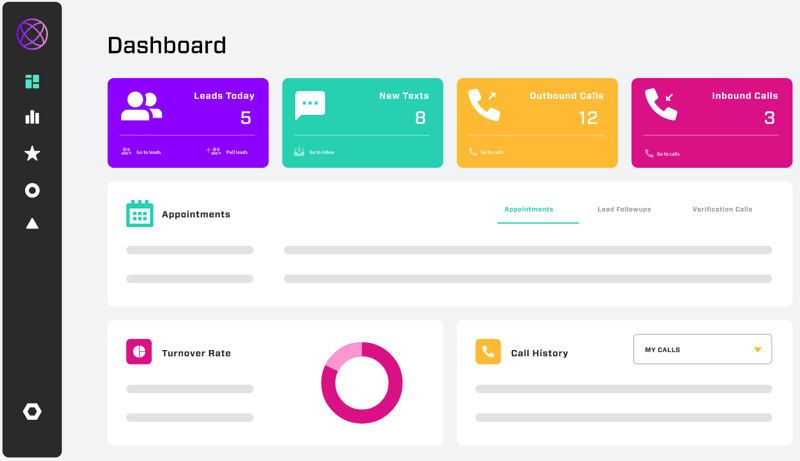
It also helps to improve your company insights and reporting because all your data is in one place.
Naturally, this has an impact on performance: companies that implement a CRM successfully can boost sales by up to 29%.
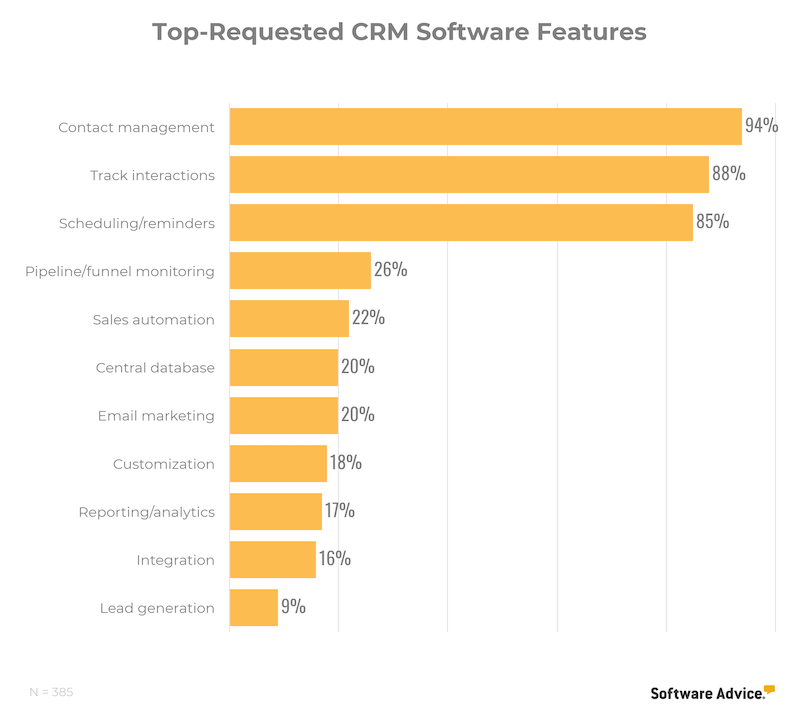
Contact management is the most-requested CRM feature, and it's one of the reasons that nearly 3 quarters of CRM users agree that CRM software improves their access to customer data.
But, just like any business software, contact management software is not one-size-fits-all. There are different kinds of contact management; to find the right one for your business, you need to know what they are.
Example of How Contact Management Works Within a CRM
While contact management focuses on efficiently handling individual contacts and their information, CRM extends its scope to encompass the broader dynamics of managing customer relationships.
Here are some specific examples of how contact management works within a CRM system:
- Storing and organizing contact information: CRM systems allow you to store all your contact information in one place. This includes contact information for customers, prospects, vendors, and partners. You can also store additional information about your contacts, such as their company name, job title, and interests.
- Tracking interactions with contacts: With a CRM system, you can track all your interactions, such as phone calls, emails, and meetings. This helps you stay organized and follow up with your contacts promptly.
- Segmenting your contacts: With the help of contact management in a CRM, you can segment your contacts into different groups based on criteria such as their industry, company size, or interests.
- Managing your sales pipeline: CRM systems assist in sales pipeline management by tracking lead progress to prioritize the most likely to close.
Different Types of Contact Management
Let's explore different types of contact management in detail, from sales-oriented solutions to cloud-based marvels, and see how each can improve your interactions. But if you're in a rush, here's a table that summarizes all their objectives.
|
Type of Contact Management |
Description |
|
Sales Contact Management |
Optimize your sales processes with dedicated software designed to organize and track interactions with potential and existing clients. Enhance customer relationships, streamline communication, and boost sales efficiency using sales contact management tools. |
|
Customer Contact Management |
Efficiently manage and organize customer interactions, feedback, and information. Utilize customer contact management systems to enhance customer satisfaction, track communication history, and tailor your services to individual client needs. |
|
Online Contact Management |
Access and manage your contacts from anywhere with online contact management solutions. These systems provide the flexibility of cloud-based platforms, ensuring seamless collaboration, data accessibility, and real-time updates. |
|
Business Contact Management |
Centralize your business contacts for improved communication and collaboration. Business contact management systems offer a comprehensive approach to managing client, partner, and stakeholder relationships, fostering better organizational connectivity. |
|
Small Business Contact Management |
Tailored for the needs of small businesses, these contact management tools provide a scaled-down, user-friendly solution. Effectively organize and nurture client relationships, supporting the growth and success of your small business. |
|
Cloud-Based Contact Management |
Embrace the advantages of cloud technology with contact management systems hosted online. Enjoy the benefits of remote accessibility, data security, and collaboration across multiple devices using cloud-based contact management solutions. |
Sales Contact Management
One of the main reasons to implement contact management software is to boost sales, and the way that a contact management CRM does this is through automating common sales tasks.
About one-third of all sales activities can be automated, including tasks like:
- Scraping websites for contact details
- Inputting contact details to a database
- Assigning contacts to reps (this is where it comes in handy to be part of a larger CRM!)
For B2B businesses, sales contact management will mainly focus on account management.
For example, you'll want the system to note your clients' organizational structure as well as their contact details so that you know who has actual purchasing power. There's no point schmoozing an HR rep if it's the head of learning and development that can give the sign-off!
Sales automation and contact management automation features can help you do this, saving your reps a ton of time and helping them use their contacts more effectively.
Customer Contact Management
As you might expect, B2C CRM features are different from the CRM features required by a B2B business.
In B2B, the sales cycle is looooong: 75% of B2B companies take an average of at least 4 months to win a new customer.
In B2C, the sales cycle is much shorter. This is because each individual has the power to purchase – as we all learn the hard way every Black Friday.
You'll therefore likely not be looking for account management features. You probably won't be reaching out to your customers personally, so don't splash out on automation tools that help you spend more meaningful time on each contact.
Instead, you'll want an automated contact management system to help you manage high volumes of contacts at once and put the right content in front of each group at the right time. An example of this in action is automated newsletter segmentation.
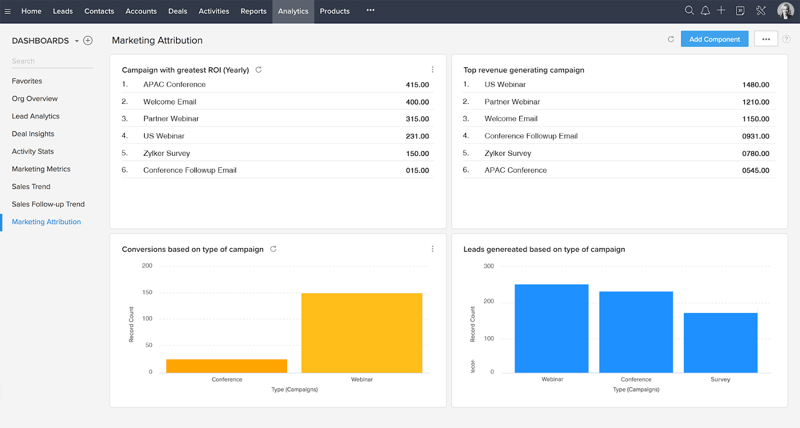
Online Contact Management
What does online contact management mean? Well, as we're mainly focusing on contact management CRM systems, it's safe to assume that all of the tools we're talking about are online. Instead, let's talk about managing online contacts.
Whether B2B or B2C, your customers are likely to contact you from a bunch of different online sources: the number of touchpoints customers are using to connect with businesses has been rising steadily since 2000.
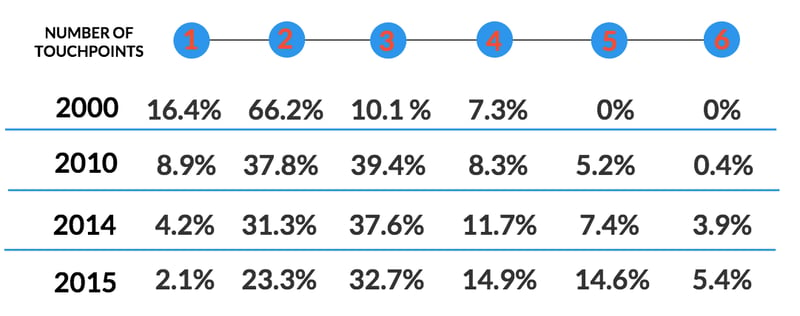
Just imagine trying to keep track of all of these different channels at once on your own. You'd need ten pairs of hands!
Omnichannel software takes care of this for you. No matter how your customers contact you, an omnichannel CRM can tell them apart and sort their communications into their own contact records. It even streamlines the data into one screen so that you can reply to them easily.
Not only does omnichannel software make customer service easier, but it allows you to run more effective campaigns. Marketers that use three or more channels per campaign earn a 287% higher purchase rate than marketers using single channels.
Business Contact Management
It's not just potential customers you need to keep track of. Vendor contact management is also very important, particularly when your business's USP is coordinating between many different services, as is the case in the travel industry.
Vendor or business contact management features will be similar to the account management features we've listed above, with your contact management system automatically scraping and storing things like:
- Vendor types or operating locations
- Contacts for each vendor
- Contract or deal details
- Assigned reps
However, there are some additional features you may need for vendors that you won't need for client contact management. For example, the ability to rate individual vendors. Here's what this looks like in Zoho CRM:
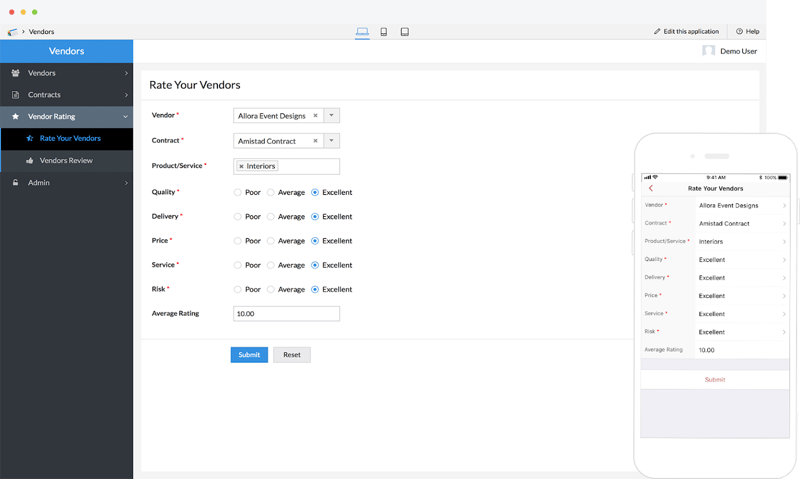
Small Business Contact Management
Listen, we get it. Big businesses are looking for all the bells and whistles and are willing to pay for them, but if you're a small business, you can't always afford heavy-duty software.
You might even be wondering if a CRM is worth it when you're still small.
We think that contact management is even more important when you're a small business because, with a small team, you really need to make sure everyone is spending their time valuably.
91% of companies with over 10 employees use a CRM. This doesn't necessarily mean a heavily customized, everything-and-the-kitchen-sink software, it just means a CRM that's:
- Simple to use, i.e. not overburdened with features you'll never use
- Scalable as you grow
- Not eye-wateringly expensive
The most important features you'll be looking for from a small business contact management CRM are the time-saving automation features we've described above.
The cost is also important. It shouldn't shoot up after the free trial is over – but more on this in a minute.
Cloud-Based Contact Management
Being able to access your CRM contacts from anywhere is key for any business in 2022, especially given the boom in remote working.
It's also essential for companies where a lot of travel is involved, such as:
- Events companies
- Management consultancies
- Regional sales
Remote access to your CRM is made possible through cloud software. Most Software-as-a-Service or SaaS CRM systems are cloud-based these days (including Ringy! Hi!) and 81% of businesses operate their CRM from multiple devices.
In a tech sense, using cloud-based contact management or cloud-based CRM systems means you don't have to host the software on your own servers, saving you time, money, and aggro from your IT team.
Where your employees are concerned, it means no more relying on email or dodgy file sharing to work from outside the office.
Advantages of Effective Customer Contact Management
Effective customer contact management is like having a well-oiled machine for your business relationships. Let's dive into the key benefits that make it a game-changer.
Enhances Customer Service and Relationships
Imagine having a personalized approach to every interaction with your customers. With robust contact management software, you can track and manage all your customer interactions seamlessly. It's like having a virtual assistant that not only remembers your customers' names but also their preferences, past purchases, and even their birthdays.
This not only fosters a stronger bond but also allows you to provide top-notch customer service. The online contact management system ensures that every touchpoint is meaningful, turning one-time buyers into loyal patrons.
Provides Better Customer Insight
In business, knowledge is power, and customer contact management software is your gateway to it. By leveraging these systems, you gain valuable insights into customer behavior, preferences, and trends. It's not just about knowing who your customers are but understanding what makes them tick.
The software for contact management allows you to analyze data, identify patterns, and make informed decisions to tailor your products or services.
Boosts Data Organization and Productivity
Say goodbye to the chaos of scattered contact information, misplaced emails, and forgotten follow-ups. A robust contact management tool acts as your digital organizer, keeping all your customer data in one secure place. This not only saves you from the hassle of searching through countless spreadsheets but also enhances productivity.
Imagine having all the relevant information at your fingertips, enabling you to respond promptly, streamline workflows, and make your team more efficient. It's the key to transforming data chaos into a well-orchestrated symphony.
Improves Internal Collaboration
In a business ecosystem, collaboration is the glue that holds everything together. A good contact management system goes beyond managing external relationships; it fosters internal collaboration too. By providing a centralized hub for customer data, communication, and updates, it ensures that every team member is on the same page.
Whether it's the sales team, customer support, or marketing, everyone can access the information they need, when they need it. This not only breaks down silos but also ensures a seamless flow of information, leading to a more cohesive and efficient work environment.
What to Look For in a Contact Management Software

Contact Management Features
With all of these priorities in mind, here are the specific features you should be looking for from a contact management CRM.
|
Requirement |
Example contact management CRM features |
|
Automating routine sales tasks |
|
|
Customer contact management |
|
|
Omnichannel communication |
|
|
Vendor management |
|
|
Access from anywhere |
|
Cost
We've been in the business a long time, so we know what's front-of-mind when you're hearing about all of these amazing features: How much will a contact management CRM actually cost?
We'll be honest, we kinda hate this question – because we bet you already know the answer.

… It depends.

Look, we promise we're not being difficult. It's just that the cost of a CRM depends massively on factors like:
- Your company's size
- The industry you're in
- The features you need
Size is probably the biggest determining factor, so here's the basic breakdown of baseline CRM investment by size (average annual/yearly cost):
|
Type of business |
Number of CRM users |
Cost range |
|
SMB |
<20 |
$10,000 - $18,000 |
|
Mid-market |
21-100 |
$25,000 - $150,000 |
|
Enterprise |
>100 |
$150,000 - $350,000 |
There are free CRM options available, either through a free trial or a free tier of a paid software, but these are usually limited in scope and will have little to no wiggle room for customization.
Examples of free software are:
- Freshsales (with a Free Forever Startup plan)
- Less Annoying CRM (30-day free trial)
- Zoho CRM (free for up to 3 users)
- HubSpot (free tier with unlimited users)
Integration
You need your contact management system to integrate seamlessly with your overall CRM, or else you're reducing a complex software to a glorified address book.
But it's also worth thinking about other integrations, perhaps industry-specific ones, that your contact management system should plug into to help you make the most of it.
These could include:
- Social media
- Industry directories
- Quote engines
- Calendars
- Task time trackers
Usability
A recent study reported that 65% of CRM users consider ease of use to be the most important requirement when selecting a CRM solution.
You might think you know what this looks like, and for the most part, you probably do. You want a clean finish, accessible colors, and all that jazz.
But you should also consider the industry you're in. The experience you have with a CRM interface heavily depends on whether it's intuitive for your users and fits the kind of tasks they need to do. This is especially true in highly-specialized industries like insurance.
We'll show you what we mean – here is an example of an insurance dashboard.
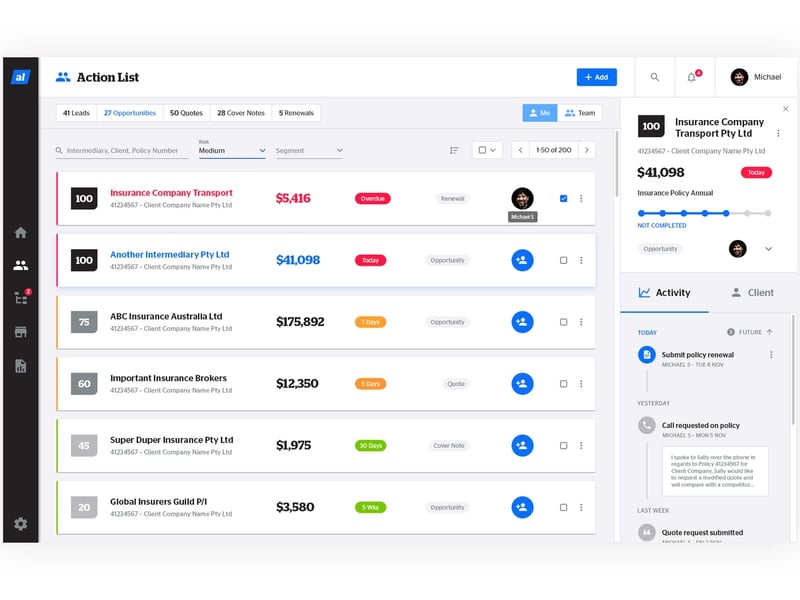
Now, compare it to an e-commerce dashboard:
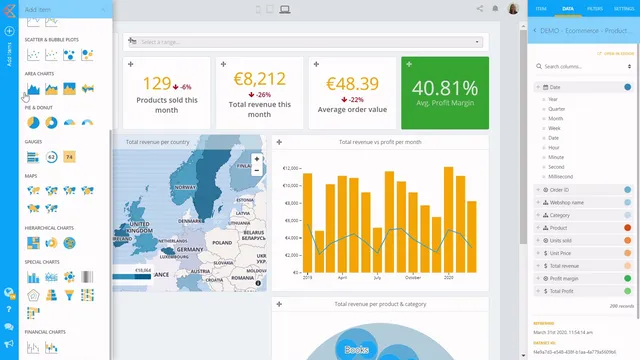
How many differences can you spot?
Onboarding & Support
Think about how complex everything we've discussed so far is. You don't want to be left to deal with all that alone, right?
Especially for small-to-medium businesses without infinite resources, onboarding and ongoing support from your CRM provider will take a lot of the pressure off, and help you get the most from your contact management system.
Top 3 Contact Management Systems in Today's Market
1. Ringy
.png?width=800&height=361&name=Ringy%20(1).png)
Maybe it's a little cheeky to put ourselves in first place on this list, but a wise person once told us that you lose 100% of the shots you don't take.
Okay, it was a meme, but you get the idea.
Ringy's cloud-based contact management tools are perfectly integrated within a powerful CRM system, allowing you not just to manage your contacts, but to make the most of them.
One of our favorite features is our cloud calling system.
Using VoIP (or Voice over Internet Protocol), you can use your integrated contact management system to call prospects over the Internet – no need to waste time dialing or logging call information.
Our cloud call center technology allows you to automatically direct incoming calls to the correct representatives, and our tracked phone number feature will even let you know which marketing campaign your leads are getting in touch with.
Combined with our strong sales automation tools and user-friendly interface, we think this makes Ringy a strong contender for the best contact management software out there – at a price that is accessible to even small teams.
Starting at $109 per month, you get access to a huge number of features, including:
- CRM + Cloud VoIP Softphone
- Click-To-Call Dialing
- Lead Management System
- Lead Distribution System
- Reports + Analytics
- Call Recording
- Local Caller ID
- SMS + Email Drip Automation
- Campaigns
- Sales Pipeline
- Lead Distribution & Tags
- Agent Coaching
You pay a small add-on according to your usage and have ongoing access to our support team to help you stay on track. That said, you should know we're not biased. So, here are some of the perks and potential cons when you sign up to use our platform.
Pros of Using Ringy
- User-friendly interface
- Scalable software and pricing
- Top-notch customer service
- Complex cloud calling software automates and enriches calls
Cons of Using Ringy
- No permanently free version available
*Pricing accurate as of November 2023
2. HubSpot
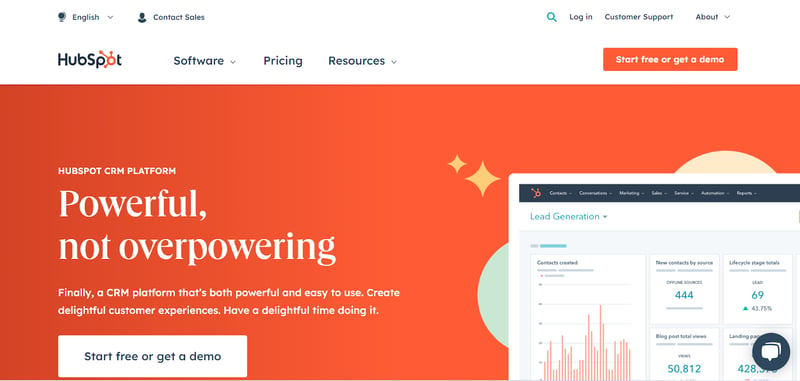
HubSpot is one of the most famous CRM systems out there, and one of the reasons is that it offers a “free forever” version of its software.
This tier offers all of HubSpot's key contact management features, like integration with Gmail and Outlook, and allows you to complete many different tasks from within the contact management window, for example:
- sending emails
- making and recording calls
- taking notes
- scheduling meetings
- assigning tasks
The star of the show is the HubSpot database. This allows you to create up to one million contacts by inputting a corporate email address and letting HubSpot's database of 20 million companies populate the rest of the information.
If you choose to upgrade to HubSpot's paid tiers, you can take advantage of its more sophisticated tools – though admittedly, these lie in areas more tangentially related to contact management.
The bad news is that the pricing begins to steepen dramatically once you leave the free tier.
|
Starter (2 paid users) |
Professional (5 paid users) |
Enterprise (10 paid users) |
|
|
Cost per month |
$20 |
$890 |
$3,600/ |
|
Cost per year |
$216 |
$$9,600 |
$43,200 |
You also only gain access to email and in-app chat support when you upgrade to the Starter version.
All this makes HubSpot the best for smaller businesses just starting with CRM software – though perhaps not a straightforward pick for bigger companies.
Pros of Using HubSpot
- Free and Starter tiers are accessible for small businesses
- Business database eliminates a lot of data entry
Cons of Using HubSpot
- The pricing scales drastically after the free tier
- The abundance of features makes for a cluttered interface
*Pricing accurate as of November 2023
3. Zoho CRM
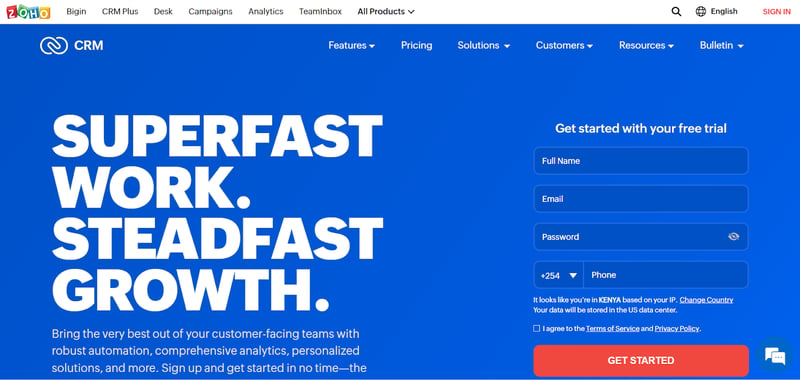
Zoho CRM is another heavy hitter in the CRM space.
Like HubSpot, it's an off-the-shelf CRM option, but with a stronger reputation for customization. Between the Zoho Marketplace and the Zoho One suite of apps, there is a huge library of integrations available to fit the CRM to your needs.
One of Zoho's standout features is the Zia AI assistant tool, which you can not only set up as a conversational sales assistant but can even remind you to complete upcoming tasks based on your contact records.
For example, Zia can recommend the best time for you to contact clients based on their contact history – very helpful for B2B sales.
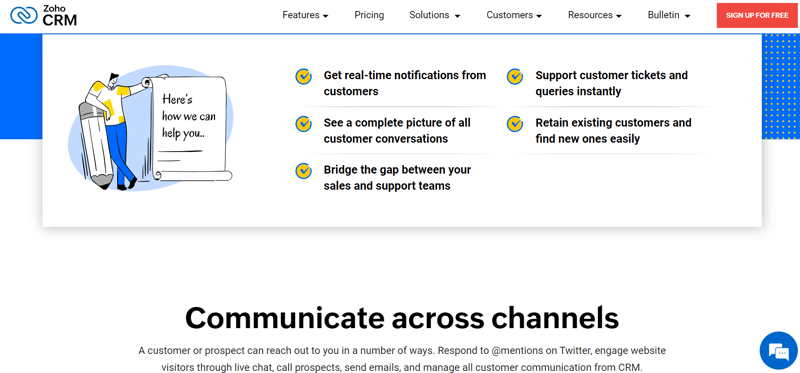
Zoho also offers Bigin, a “customer context” tool with a simplified contact management interface specifically designed for small businesses.
Its pricing scales much more sustainably than HubSpot. However, Zoho has the drawback of being a more complex software.
Although there is a 15-day free trial of the paid version and a free forever version, if you want more hard-hitting results, you'll need to employ a Zoho development partner to install the software.
|
Starter |
Professional |
Enterprise |
Ultimate |
|
|
Cost/user/month |
$1814 |
$3023 |
$4540 |
$5552 |
As well as being expensive (just scroll back up to see our previous table on this subject) this could take up to a year in most cases, and perhaps more depending on the complexity of the task.
Pros of Using Zoho
- Highly customizable
- Extensive insights and analytics available
- Pricing scales more accessibly than HubSpot
Cons of Using Zoho
- Need to employ a Zoho partner to install it if you want a full-service CRM option
*Pricing accurate as of November 2023
Conclusion: Let Ringy Take Care of Your Contacts
Remember that pipe dream you had about someone sorting out all your contacts for you?
Doesn't seem so crazy now, does it?
We believe Ringy is the best candidate to be the personal assistant in your pocket.
Our cloud calling software and contact management tools are enough to supercharge your selling and make sure you're maximizing your contact list, not just managing it.
Book a demo today to find out how Ringy can take your business to the next level.

Skyrocket your sales with the CRM that does it all.
Calling? Check. SMS? Check. Automation and AI? Check. Effortlessly keep in touch with your customers and boost your revenue without limits.

Take your sales to new heights with Ringy.
Sales in a slump? Ringy gives you the tools and flexibility you need to capture leads, engage with them, and turn them into customers.
Subscribe to Our Blog
Enter your email to get the latest updates sent straight to your inbox!
Categories
Related Articles





































































































